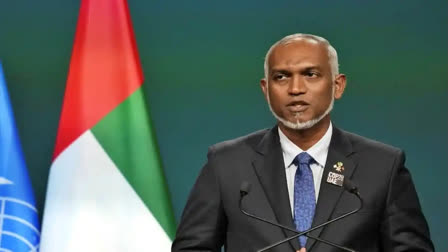New Delhi: With the main opposition parties in the Maldives parliament preparing an impeachment motion against President Mohamed Muizzu amid a diplomatic row between New Delhi and Male, the Indian Ocean archipelago nation is faced with political instability ahead of parliamentary elections scheduled to be held in March.
According to reports in the Maldivian local media, the main opposition Maldivian Democratic Party (MDP), which is in majority in the 87-seat People’s Majlis, has prepared the impeachment motion along with members of the Democrats party. While the MDP has 43 members in the People’s Majlis, the Democrats party has 13. Together, they have 56 members – enough to pass the impeachment motion.
The Sun Online news website quoted an MDP lawmaker as saying that the two parties have gathered enough signatures for an impeachment motion. However, they are yet to submit it. So, what happens if the no trust motion against President Muizzu, seen as pro-China and anti-India, gets passed in parliament?
“This is a completely new situation,” Anand Kumar, Associate Fellow at the Manohar Parrikar Institute of Defence Studies and Analyses and author of the book 'Multi-party Democracy in the Maldives and the Emerging Security Environment in the Indian Ocean Region', told ETV Bharat. “Earlier, according to the Maldives constitution, the president has to serve the full five years of his term. In case Muizzu gets impeached, this will lead to a tense political situation in the Maldives.”
In December 2023, the Maldivian Parliament’s regulation was amended granting the MDP the power to impeach the President without requiring support from minority parties. The removal of the President can be passed by a two-thirds majority of Parliament, which is 58 out of 87 members. The MDP Parliamentary Group proposed an amendment to change the way the total number of MPs is determined due to the resignation of seven MPs, who have joined the new government of President Muizzu.
With the parliamentary regulation being revised following the resignation of the seven MPs, the total number of MPs now stands at 80. In such a situation, the two-thirds majority stands at 54. The MDP and the Democrats together have 56 members. According to Kumar, if Muizzu wants to sort out the matter outside parliament, he may not have enough supporters to meet the challenge posed by the MDP and the Democrats.
“Remember, Muizzu won the presidential election with the help of his mentor and former President Abdulla Yameen,” he said. “The two leaders have now fallen out.” Muizzu, it may be mentioned, was the joint candidate of the People’s National Congress (PNC) and the Progressive Party of Maldives (PPM). Initially, Yameen of the PPM, known for his pro-China stance, was nominated as the joint candidate of the PNC and the PPM. But since Yameen is serving an 11-year jail term due to a money laundering case, he became ineligible to contest the election. As a result, Muizzu of the PNC was nominated as the joint PNC-PPM candidate.
However, after winning the election, Muizzu refused to respond to Yameen when the latter tried to contact him. A miffed Yameen then left the ruling PNC-PPM coalition and formed a new party called the People’s National Front (PNF). Kumar said in case Muizzu is impeached, Vice President Hussain Mohamed Latheef will have to take over. Latheef too belongs to Muizzu’s PNC.
Calls for the removal of President Muizzu have been growing ever since he assumed office in November last year due to his anti-India policies. Ties between India and the Maldives have been on the downswing ever since pro-China Muizzu assumed office as President last year. Muizzu had won last year’s presidential election on a pronounced anti-India plank. He ran an ‘India Out’ campaign in which he called for the withdrawal of some Indian military personnel present in his country. These personnel, numbering less than 100, are primarily involved in humanitarian assistance and disaster relief work in the Indian Ocean archipelago nation. However, after assuming office, Muizzu made a formal request to India to withdraw these personnel.
Last month, the Maldives decided not to renew a hydrography agreement with India citing national security concerns and the safeguarding of sensitive information. The hydrographic survey agreement was signed on June 8, 2019, during Prime Minister Narendra Modi’s visit to the Maldives. Under the agreement, India was allowed to conduct a comprehensive study of the island nation’s territorial waters, which includes reefs, lagoons, coastlines, ocean currents and tide levels.
And then again, the Maldives decided to allow a Chinese vessel to enter its territorial waters ostensibly to do research work. This decision came despite pressure from the Indian government and concerns raised by various quarters about the vessel being a “spy vessel”. India has strongly been protesting the repeated visits by Chinese vessels to the waters of the south Indian Ocean, a region New Delhi considers to be under its sphere of influence.
